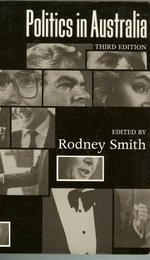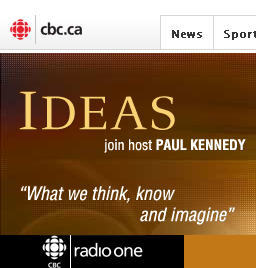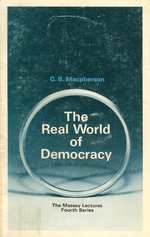Everyone is a democrat, but what is “democracy?”
To say that democracy is equal to motherhood is to say that it is an unquestioned and unquestionable GOOD THING most of the time in most places in the world. I have tried teaching democratic theory a few times and found it hard going. Why? Because for students it is a GOOD THING and analysis diminishes it. My own chapter on democracy in Politics in Australia edited by Rodney Smith is my take some years ago.

Amazon shows the book as available but scarce for keen readers.
But that experience put me in mind to find more material to use in teaching. I came across a Canadian Broadcasting Corporation (CBC) podcast which I downloaded and eventually listened to. Why “eventually?” I had to overcome my dislike of CBC podcasts. Why dislike the bland old CBC? Every CBC podcast I have tried, and there have been many, is preceded by a shrieking twelve year old advertising the CBC. I had given up either gritting my teeth while it played out or fumbling with the Iphone controls to skip it, this latter being too much to do while out dog walking. But finally one day with the dog off the lead, I did select CBC Radio/Ideas and listened to the first of a two part segment on democracy. It is very excellent and I recommend it to listeners.

The link is http://www.cbc.ca/ideas/podcast.html
May 19 – Talking Philosophy: Democracy, Part 1
May 25 – Talking Philosophy: Democracy, Part 2
What’s so good about these podcasts? First the radio host is not nearly as intrusive as most journalists are. He does not try to make the entire broadcast about himself, which so many journalist do these days in the name of “subjective journalism.” The label says it all. Mind you the host does intrude, and when he does, I am afraid he meets the normal standard for contemporary journalism: Under-prepared and over-insistent. Evidently, the latter is compensation for the former. Hence the host persists for a time in trying to reduce the conversation to elections. Fortunately, the speakers do not follow this lead, and the result is a wide ranging and, at times, very meaningful discussion of a term we mostly think we already understand, but don’t.
The most significant point from the two hours of discussion is the foundation of democracy on Immanuel Kant’s conception of the moral person as autonomous. That is the liberalism that lies at the heart of democracy as progenitor, but also as constraint, because it limits the majority from tyranny and paternalism. The term “liberal democracy” has been a term of contempt in the academic world for the last two generations in Western countries. Only those who live within the comfortable confines of liberal democracy can be contemptuous of it. For the rest of the world it was the impossible dream, and still is.
Note that it is a philosopher’s discussion, and so there is hardly a sustained passage about democratic political institutions and how they do, might, can, or should work. The few references to democratic reality are given the easy disparagement that can only be offered by we professors who have never felt pain. So Winston Churchill is dismissed in a line.
The most conspicuous omission is also very common in Canada. There was not a word about the clash of democracies within Quebec among the pluralities of Quebecois, Quebeckers, migrant communities that see English as the future for their children, and Native Peoples, nor a word on the concurrent majoritarianism that now exists in Canadian public policy.
The other omission was any reference to C. B. Macpherson’s The Real World of Democracy of 1965.

It was a very influential Canadian book, a rare thing. Reading it today is most entertaining. According to Macpherson the Eastern European regimes and the Soviet Union itself were very democratic, and enjoyed legitimacy and popular support. Yes, you read it here first. Arriving at this conclusion nine years after the Hungarian uprising required the agility of a teenage Romanian Olympic athlete but Macpherson did it, by resting the meaning of democracy on social order and the means to live. The resulting standard was so low any government that perpetuated itself met Macpherson’s standard of democracy. Those influenced by the book at the time were thus proud to proclaim the democratic virtues of Enver Hoxha’s dictatorship in Albania as preferable to the Liberal Democracy of a Pierre Trudeau government. See, respectively http://en.wikipedia.org/wiki/Enver_Hoxha and http://en.wikipedia.org/wiki/Trudeau
Those were the days!
Today these same people would be extolling Comrade Number One in North Korea and telling us that the people of North Korea support the regime. Just look at those televised spectacles. http://www.kcna.co.jp/index-e.htm
On C. B. Macpherson see http://en.wikipedia.org/wiki/C._B._Macpherson
The editors of that 1970s issue of National Geographic magazine that found East Germany to be the one place where communism works must have schooled with this book. The mistake was to confuse nationalism and the regime. The reality is that as soon as the regime weakened its enforced hegemony, it was cast aside. (I have commented on this issue of the magazine in another post on the blog. Search for it to find more.)
Notwithstanding my observations, the two discussion are well worth hearing.

Whether you are planning a career in the public sector or the media, or voting in local, state and federal elections, you need to understand the political system. Politics In Australia provides a comprehensive introduction for anyone who wants to understand the dynamics of Australian politics and participate effectively.